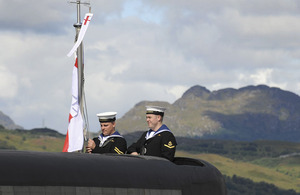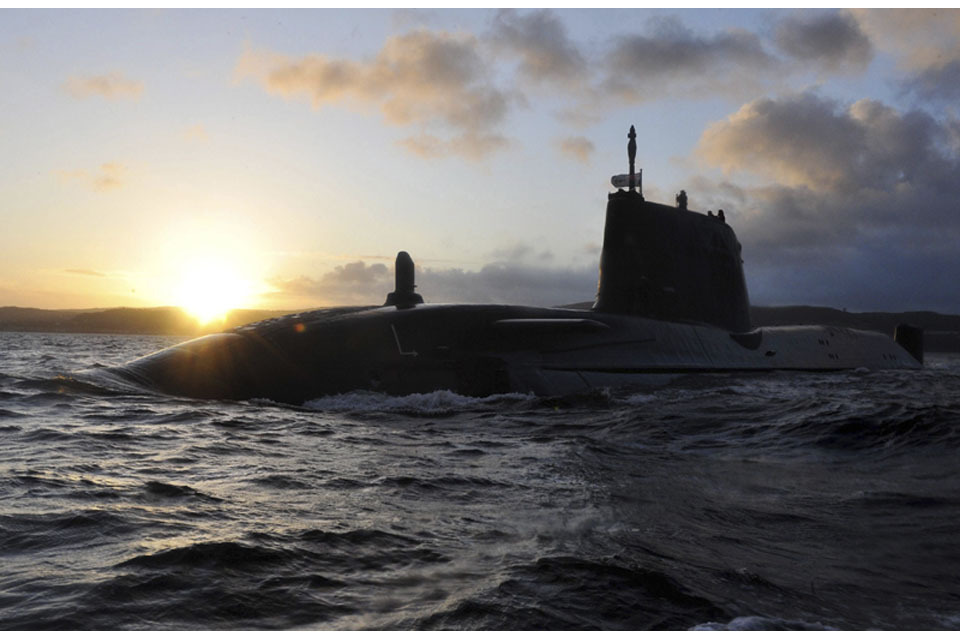UK's most powerful submarine joins the Navy
The UK's most powerful attack submarine, HMS Astute, has been welcomed into the Royal Navy today in a commissioning ceremony overseen by the boat's patron, the Duchess of Cornwall.

The commissioning pennant is raised on HMS Astute [Picture: LA(Phot) A J MacLeod, Crown Copyright/MOD 2010]
HMS Astute, which officially becomes ‘Her Majesty’s Ship’ today, is quieter than any of her predecessors, meaning she has the ability to operate covertly and remain undetected in almost all circumstances despite being fifty per cent bigger than any attack submarine in the Royal Navy’s current fleet.
The latest nuclear-powered technology means she will never need to be refuelled and can circumnavigate the world submerged, manufacturing the crew’s oxygen from seawater as she goes.
The submarine has the capacity to carry a mix of up to 38 Spearfish heavyweight torpedoes and Tomahawk land-attack cruise missiles, and can target enemy submarines, surface ships and land targets with pinpoint accuracy, while her world-beating sonar system has a range of 3,000 nautical miles (5,500km).
The First Sea Lord, Admiral Sir Mark Stanhope, said:
The Astute Class is truly next generation - a highly versatile platform, she is capable of contributing across a broad spectrum of maritime operations around the globe, and will play an important role in delivering the fighting power of the Royal Navy for decades to come.
A highly complex feat of naval engineering, she is at the very cutting-edge of technology, with a suite of sensors and weapons required to pack a powerful punch.
Today is an important milestone along the road to full operational capability which will follow after a further series of demanding seagoing trials testing the full range of the submarine’s capabilities.

Astute arriving at her home base on the Clyde in November 2009 [Picture: LA(Phot) J J Massey, Crown Copyright/MOD 2009]
Following the successful completion of her first rigorous set of sea trials, which began at the end of 2009, HMS Astute has also now achieved her in-service date, signalling that she has proven her ability to dive, surface and operate across the full range of depth and speed independently of other assets, thereby providing an initial level of capability.
Rear Admiral Simon Lister, Director of Submarines, who oversees the build programme of the class for the MOD, said:
To my mind Astute is a 7,000-tonne Swiss watch. There is an extraordinary amount of expertise that goes into putting one of these submarines together. There are stages when it’s like blacksmithing and there are stages when it’s like brain surgery.
So to see Astute commissioned is momentous not only for the Royal Navy, who have been eagerly anticipating this quantum leap forward in capability, but for the thousands of people around the country who have been involved in the most challenging of engineering projects.
Following the commissioning, HMS Astute will return to sea for further trials before she is declared as operational.
As the base port of all the Royal Navy’s submarines from 2016, Faslane will be home to the whole Astute Class, including Ambush, Artful and Audacious which are already under construction.
Astute was built by BAE Systems at Barrow-in-Furness, with hundreds of suppliers around the country contributing component parts, including Rolls-Royce, Derby (nuclear plant); Thales UK, Bristol (visual system and Sonar 2076); and Babcock, Strachan & Henshaw, Bristol (weapon handling and discharge system). Astute is affiliated to the Wirral in the North West.
About HMS Astute
- She is 97 metres from bow to stern.
- She has a beam of 11.2 metres.
- She displaces 7,400 tonnes of seawater.
- Her cabling and pipework would stretch from Glasgow to Dundee.
- She is the first Royal Navy submarine not to have a traditional periscope, instead using electro-optics to capture a 360-degree image of the surface for subsequent analysis by the commanding officer.
- Astute is the first submarine to have an individual bunk for each crew member.
- She manufactures her own oxygen from seawater as well as her own drinking water.
- She could theoretically remain submerged for her 25-year life, if it were not for the need to restock the crew’s food supplies.
- She is faster under the water than she is on the surface - capable of speeds in excess of 20 knots (37km/h), although her top speed is classified.